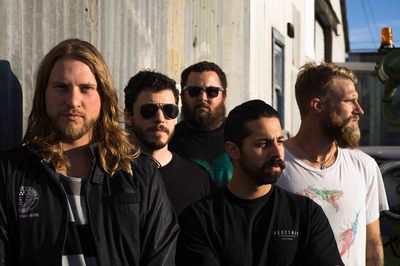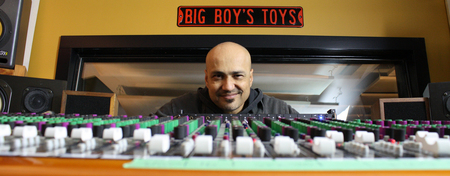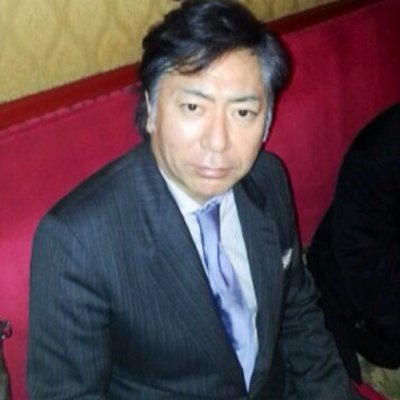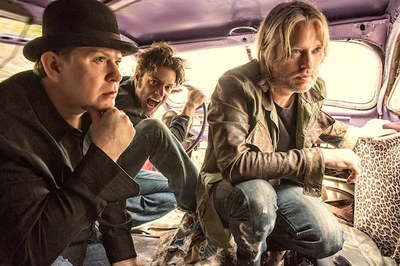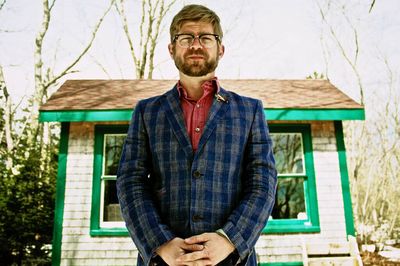A Conversation with Giorgio Moroder
Mike Ragogna: Giorgio, your new album Déjà Vu is getting a lot of critical acclaim. What do you think about that?
Giorgio Moroder: There are some critics who don't like it, of course, and some who maybe over-like it. But in general, I'm very happy. A week ago I was number one on the Billboard dance chart, that's quite nice to hear actually.
MR: How do you think this album -- your first in thirty years -- fits into Giorgio Moroder's musical history?
GM: It's totally different. Until twenty years ago, I would work with an artist in the studio. With Donna Summer, I would say, "Okay Donna, for the next two weeks, we're in the studio and we work." Right now, the way to work is totally different, so sometimes it's a little bit difficult to find a sequence of songs which fit in, because all of the singers are different, everybody has a different idea about the lyrics, about the melody, I think it's a great album in itself but it doesn't have the continuity of an album where I would sit in the studio with the act and start working. Plus the way to work right now is so different. A lot of stuff is done on the internet; some of the acts, I never met. It's a much more difficult approach to do a record but the big advantage is it has a lot of variety of sounds, different voices, of course, and different kinds of lyrics.
MR: And mainly that's because of all your collaborations, right?
GM: Yes. Let's say in the case of Sia -- who I loved even before she had the big hit with "Chandelier" -- I gave her the tracks, which had a certain melody on them and she wrote the hook line and did all the singing, lyrics and harmonies. It's a collaboration but not in the sense of collaborating in the studio, starting a song together and recording and arranging it together. It's different now. The music industry has changed a lot, especially the way collaborations are done.
MR: Speaking of collaborations, Daft Punk's track "Giorgio By Moroder" on their monster album Random Access Memories has been a fantastic musical education on you for younger generations. When they interspersed your interview into that track, did that make you realize you're still a part of the culture?
GM: That's absolutely true, though it's kind of a little bit absurd that I'm talking about my life on a pop record. I'm talking about my struggle in the beginning and then the use of the synthesizer and how it all was done and it's interesting that at the same time, you hear the music progress from early disco into jazzy stuff and then the beautiful drum things. It's quite unique. I had a real surprise, actually, when I first heard it.
MR: It seems like in the last few years, music production is taking its cues from eighties production values. Is it a surprise that it's coming full circle with people enjoying music production values that you helped introduce?
GM: Yes, I guess so. It's very interesting that in movie scores, things like The Social Network and Drive where the composers now use synthesizers only, they don't have any strings or guitarists. That's one interesting movement, where they're going back to the eighties sound, although with much better, clearer, nicer sounds. Record-wise, I don't know; the world right now is so different. I just saw that James Taylor with his guitar is number one, so I feel a little bit like everything goes right now. Nobody really knows what's really "commercial" or what could happen.
MR: Have you been exploring online with social media or other aspects of technology that you hadn't before?
GM: Absolutely. It's interesting how important it became. I don't really know how it works, but I have to work on pictures and I have to come up with ideas of "what's new." I think it's absolutely important to build up. It's a great way to tell people what I'm doing, apart from the fact that that I don't think it's that important what I ate for breakfast in Rome. It's a new way to connect with the fans.
MR: When you look at current technologies, are there moments for you as a producer when you look back at your earlier records with Donna Summer, Blondie or David Bowie and others and say, "I wish we'd had this technology back then"?
GM: Yeah, that's true. Obviously, in the time of Donna and David, we had certain instruments like guitar and bass and drums and Fender Rhodes but we didn't have all the effects we have today or the digital quality. The drums were more simple but very effective, very well-placed. Now, of course, we have extremely intricate and complicated drum loops. Sometimes I wish I could record those songs now and release them again back then. But sometimes, a simple guitar riff or a simple drum loop like in Blondie are so driving that it's still a great record.
MR: I'm awed by the list of songs you sonically introduced. Of course, there are all of the big Donna Summer hits, but there are Kenny Loggins' "Danger Zone," Berlin's "Take My Breath Away," Irene Cara's Flashdance hit "What A Feelin'," Blondie's "Call Me," and many more. Even your own works as a film composer for Midnight Express, Cat People, and American Gigolo as well as your hit "Chase" still are appreciated after all these years. Plus your productions are sampled often and you're currently an in-demand DJ. What do you think it is about your approach to music that made it resonate?
GM: "Love to Love You Baby" was absolutely erotic for the time. The BBC didn't play it, but from what they tell me now, it liberated a lot of women. They felt more safe and secure of themselves. Then there was "I Feel Love" that generated a lot of interest from the gay community. In fact, now when I play "I Feel Love," that's the song which people love the most. I think that song changed the attitude a little bit. Some gay people tell me it was a song which liberated them. The movie songs are all good, but I don't think that's anything special. "Flashdance" was great because it worked so well with the movie and it helped to generate a new style, the way women dressed. Some of those songs helped establish a start of a new fashion.
MR: By the way, I think Daft Punk's "Giorgio By Moroder" track is one of the highest profile musical tributes ever. Giorgio, when you look back at your career up to this point, what are your thoughts?
GM: I'm a pragmatic person. I just think I did my work. Some songs were great, some were really good, a lot were just okay and a ton of songs were very bad songs which hopefully nobody knows. You do what you can. As you said, the tribute by Daft Punk was a highlight of my musical life, especially coming from a highly intelligent and great group like those guys. I don't think I would've trusted anybody else in doing something like that. They really did a good job, from the beginning to end.
MR: Giorgio, it's been thirty years between albums for you, your last solo work being Innovisions. After all this time, why did you decide to release a new album?
GM: I had an opportunity. I started to DJ, which I love to do and I continue to do, so I got back into the music with that. It's great to be out there and kind of perform. It's not a musical performance, but it's performing in front of people. Then the big success with Daft Punk's album suddenly led to offers to do an album. If someone had asked me three or four years ago, I would've said, "No way is someone going to offer for me to do an album." I was retired. But the offers came in and it's difficult to say, "No." Plus I enjoy it, I love to be back to work. I think I work as hard now as I worked in the eighties.
MR: Did you surprise yourself with any of the songs on Déjà Vu?
GM: Yes, I particularly like the Sia song because I was able to go back to the early, early disco sounds with the strings and the way the bass is played and the drums and the Fender Rhodes. Even the melody has a big extension from low to very high. That was the song that I probably like the most, and the one that was most interesting to do.
MR: What advice do you have for new artists?
GM: It's difficult but there are some advantages which the newcomers have now. The way to record now is so much cheaper than when I started. When I started, you needed at least at a thousand or two thousand dollars to do a record and you had to go into a studio and possibly pay some musicians and then to launch it, there was always the record company. If you weren't able to have a contract with a record company, there was no way. Now most of the young people have a laptop and programs like Garage Band. You can do so much great, absolutely top quality stuff if you're talented. And then to launch it, it's still difficult to get a deal in the industry, but if you know how to navigate the internet, you can do a lot of stuff. I know some of the DJs who are making a ton of money have never had big hits on the radio. Some don't have any hits but with social media tools like YouTube, you can launch a song or launch your career. Obviously, in the end, if you're not talented, nothing will happen. But if you're talented and have the drive to be successful, it's a relatively easy time now.
MR: Do you feel like your time with Donna Summer was a laboratory you never left? Do you still believe strongly in the creative process you used with your early records?
GM: Yeah, somehow I wish that was happening now. I would do a very little demo and then I would give it to Donna and she would write lyrics and then we would go into the studio with the musicians. It seemed to be so easy, I had my drummer and my bass player and my keyboard, it was a big family. There were no big discussions. Donna was great. She would sing the song in an hour. We never really thought, "Oh, this is going to be a hit!" Once we recorded the track, that was it. Plus, at that time, you couldn't go back and change so much. The problem with tracks now is you're never happy. "Is that the right one or should I change it?" With Donna, we would do a track in a day, recorded and mixed. When I did a recording for a song for the Beijing Olympics in 2008, I had exactly one hundred different versions of the song. I was not happy with some and the Chinese were not happy with some, so I redid them. That's only possible now because it's no big deal; you just open the file and change it. It's so easy. In the past, it wasn't so easy. I kind of wish those days would come back but I think you can only do that if you do an album with one act. Right now, the record companies usually want at least two or three or four different producers and composers. The world is different but that's how it is now.
MR: Considering all of your success wearing different hats, do you ever truly think of yourself as an artist?
GM: No. A long time ago, I started to sing, and I would do some performances but I think to become successful as a performer you have to do it on a daily basis, and I was never interested in going back and touring as a singer because I was always nervous about things like forgetting the lyrics. I'm more of a performer now when I DJ than I was ever a performer like an artist, going up and singing and talking to the audience.
MR: With all of your recent success, might this feel like it's the best time of your life?
GM: It's a great time. I don't know about "the best," but it's certainly great!
Transcribed by Galen Hawthorne
******************************
HY BRASIL'S "WALK AWAY PREMIERE WITH JEREMY PIVEN CAMEO
The video for "Walk Away" is taken from their forthcoming EP Animal's Grace in August. Jeremy Piven makes a cameo stand-in for the drummer throughout.
According to Hy Brasil's Andrew Jones...
We went to Malibu the next morning with our instruments and filmed the whole day, half of the day spent capturing shots of us playing our instruments on the beach. It just so happened we were filming in front of Jeremy Piven's house, he was home and very intrigued with what we were doing.
Mr Piven came over to us, he ended up telling us that he played drums, so I told him to play them in between takes. He let us film him and said it was ok to use the footage, so that is why Jeremy Piven is in the video.
It was a very random day but we were all very happy with the way it turned out. Sean Flynn is a very talented filmmaker, and we couldn't have done this video without the beautiful unicorn Shannon Lewis!
******************************
ADHAM SHAIKH'S "SABADUB" EXCLUSIVE
According to Adham Shaikh...
"Sabadub (Floating Soul Mix)" was produced and edited by Lichi Video, India. The footage was shot at several locations around the sub-continent and sourced from in-house archives. The video marries the mythos of the "Walla" (the suffix "-walla" indicates mastery in a particular discipline) with the everyday cultural fabric of India.
I chose to use footage from India because through the process of creating Basswalla, the album on which the track appears, I discovered a deep connection to my Indian heritage. To further underline this feeling, as well as to tie the track to the album, we inserted the definitions of the many different types of "walla" one might encounter in India.
This song is also special to me because it features the bansuri flute playing of the late Catherine Potter, a dear friend and very gifted musician who left us all too soon. This song is dedicated to her, and I dubbed it the "Floating Soul Mix" in her honor.
********************************
A Conversation with Yoshihiko Shinoda
Mike Ragogna: Yoshihiko, Doraemon seems to be one of the more popular TV shows both in Japan and now in the U.S. through the Disney XD channel. What do you think makes that rascally robot cat such a global star?
Yoshihiko Shinoda: Doraemon has been broadcast in 37 countries and regions including the US. Particularly in Asia, which includes China, Taiwan and Thailand, both manga [comics] and the TV animation series have been a humongous hit and beloved for over 20 years. Doraemon has been receiving very high ratings in these countries/regions, and we think it's very special that it has been continuously airing for a long period of time without stopping. The story of Doraemon takes place in the normal, ordinary neighborhood of a little boy called Noby. Then, Doraemon, a blue cat-shaped robot from the future, which is absolutely extraordinary, appears. The neighborhood of Noby, the ordinary, and Doraemon, the extraordinary, co-exist perfectly together, and that is the significance of Doraemon. Doraemon is, of course, the symbolic character in the series, but Noby is another very important character, which makes this series so special. Noby is the most heart-warming sweet little boy, but on the other hand, no one can ever be more lazy or foolish than Noby. Doraemon helps Noby out with various kinds of secret gadgets to get him out of misery. However, even with the gadgets from the future, Noby manages to fail, over and over again.
MR: What's the story behind the charter's manga then TV creation and eventual rise to Japanese superstardom?
YS: Four of Fujiko F Fujio's manga series -- let us call him "Sensei" from here and on--had been adapted as TV animation series before Doraemon. I believe many people would imagine a story about "heroes" when it comes to comics or animation. However, Doraemon is not one of them and has a totally different approach. Doraemon does not battle, but supplies the little boy with never-before-heard-of gadgets from the future. Doraemon does not fight for Noby, but goes through adventures with him. This concept brought a completly new perspective for the series. Secret gadgets are definitely the most unique and wonderful aspects of Doraemon which makes it so special. Also, the Doraemon franchise includes both movies as well as the TV series. A new movie is released every year in the spring, and it has been more than 35 years since its premiere movie. Manga became animation, and then it extended to a movie series. I believe Doraemon's tremendous success in multiple mediums led him to become a symbolic character representing Japan.
MR: Doraemon's pocket reminds me of Felix The Cat's bag of tricks. Might that character have been a bit of an inspiration for Doraemon?
YS: Felix is not an inspiration for Doraemon. There is an episode called "The Birth of Doraemon," which explains how Doraemon was created. The episode portrays Sensei himself where he could not think of any good ideas for the new comic series and wished he had a magical gadget to help him out. The story also unveils the fact that the figure of Doraemon came from a toy that he accidentally tripped on and which was, of course, a cat. The combination of those two experiences created Doraemon.
MR: Since Doraemon has traveled back in time to change the path of Soby Noby's grandfather, the concepts of making right choices and bullying are addressed and it seems there are other bigger messages contained in the series. Will the series continue on this path and can we expect any changes regarding the characters?
YS: Doraemon is all about dreams, love, friendship, hope and kindness, and I can promise you that this will never ever change, even in the far future. The episodes of the TV animation series are based on the original stories written by Sensei, but in addition, we have been creating new episodes just for the TV series. However, the message that Sensei poured his soul into will never change and the production staff is proud to inherit his devotion to the next generation.
MR: How do you predict Doraemon's affect on kid culture will eventually be in the U.S.?
YS: We would like Doraemon to be the best friend that everyone always wants on their side. Doraemon has been loved in Japan for such a long time that everyone, and I mean EVERYONE has grown-up watching Doraemon, young and old. We would like to continue broadcasting Doraemon in the U.S. so that he becomes everybody's best friend, just like in Japan.
MR: I personally believe much of Disney's TV schedule -- especially shows like Girl Meets World, Phineas & Ferb, Mystery Shack and your show, Doraemon -- is some of the best youth programming available. What are your observations or personal feelings about Disney's effect on youth culture in the U.S.? By the way, how did your association with Disney begin?
YS: Doraemon is not an educational program, but fun, exciting animation that all kids will want to watch for enjoyment. However, it is unconsciously providing kids with experiences to learn many lessons in life -- simple but important lessons that all kids need to get through in the process of growing up. Other programs broadcasted on Disney probably share a similar aspect. We actually have been in association with Disney before the launch in the U.S. Doraemon started broadcasting on Disney and Disney XD in Poland, Turkey, Israel, and Pakistan just in the year 2014 and many more in the past. India is another country where Doraemon is also a mega-hit!
MR: So if you could be Doraemon and go back in time to change any events or anyone's lives, what would that look like?
YS: I am too tired to go back in time to do everything over so I think I'm good where I stand right now. lol. I have been and will be working as hard as I can!
MR: [laughs] What else are you working on?
YS: I am also doing business with the electronic edition of the manga(comics), movies, and any other projects concerning Doraemon. Last year we made the first 3D CGI Doraemon movie called Stand By Me Doraemon and it has been a huge hit in Japan and other countries including China. Speaking of the electronic edition of the manga, it was released in the U.S. before the TV animation series.
MR: Yoshiko, what advice do you have for new artists?
YS: I would like to say that "perseverance brings success."
MR: Do you have any gadgets in your own pocket that Doraemon and Noby would be proud of? Maybe a time-traveling doorway?
YS: I would have to say Doraemon itself. Doraemon has brought me a countless number of dreams and hope.
********************************
OWL'S "THINGS YOU CAN'T SEE EXCLUSIVE
Owl's camp explains...
Chris Wyse is frontman and bass player in LA/NY-based rock band Owl, whose third album, Things You Can't See, is due out on July 28th. Chris is also the bass player for former lead guitarist and founding member of KISS, Ace Frehley, and was the bass player in seminal rock outfit The Cult for a decade.
The group's frontman adds...
As the title track, this tune exemplifies the idea behind the whole record, namely that just because you are not immediately aware of the forces surrounding you in life, it does not mean that they don't affect you and those around you. The song really captures all the elements of what we in Owl do best in one tight package.
Owl Tour Dates:
7/17 New York, NY @ Lucille's Bar & Grill in BB King's Blues Club
7/18 Saratoga Springs, NY @Putnam Den
7/19 Providence, RI @Aurora Providence
7/21 Los Angeles, CA @Whiskey A Go Go (with Philm featuring Dave Lombardo of Slayer)
7/23 San Jose, CA @Rockbar (with Philm featuring Dave Lombardo of Slayer)
********************************
OLD MAN LUEDECKE EXCLUSIVES
According to Old Man Luedecke's camp...
When it came time to record his new album, Old Man Luedecke from Nova Scotia decided on the only location that made any sense -- a cabin he built in the woods behind his house, a hand-hewn affair made of rough-sawn lumber.
As the title suggests, Domestic Eccentric is a record mostly about home, what it means to be a still-youngish man, what it's like to still be in love with the woman you started writing songs about over a decade ago, what it's like to watch your own babies grow to children, and about the joys and sorrows attendant upon the milestones of parenthood.
Chris 'Old Man' Luedecke, along with multi-instrumentalist and multi Grammy-Award winner Tim O'Brien, will release Domestic Eccentric on July 24th via True North Records. Listen to an exclusive sneak peak of the album with 'Year of the Dragon.'
And the artist adds...
Find Freedom! My birth year was the year of the dragon. We started recording at home in a cabin I built on a full moon on my birthday. This song is a love mystery that exhorts self-reliance. I also think the harmonies sound rather like Wilson Phillips for a sort of bluegrass-y number. Enjoy.


